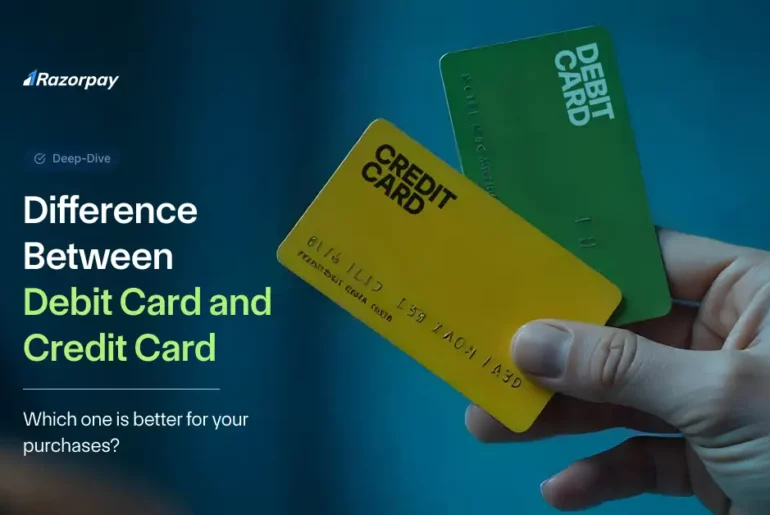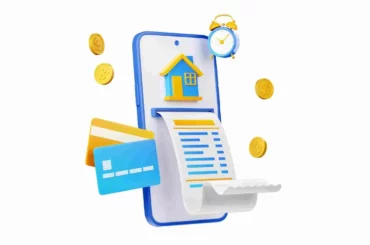In today’s fast-paced world, credit and debit cards have become essential financial tools for young Indians. Whether it’s for online shopping or making quick payments at stores, these cards offer convenience and security in everyday transactions. Although they look similar, the difference between credit and debit cards lies in how they function. Debit cards draw directly from your bank account, while credit cards let you borrow money within a set limit to pay later.
Understanding the difference between credit card and debit card is vital for making smarter financial choices and managing your money effectively.
Table of Contents
Debit Card vs. Credit Card: What’s the Difference?
Factor |
Debit Card |
Credit Card |
|
Definition |
A payment card that deducts funds directly from your savings or current account. |
A payment card that allows you to borrow funds for purchases, subject to a pre-approved credit limit. |
|
Source of Funds |
Uses your personal bank account balance. |
Utilises funds borrowed from the card issuer, essentially a short-term loan. |
|
Spending Advantage |
Limited to the balance available in your bank account. |
Enables spending beyond your account balance, up to the credit limit. |
|
Payment Responsibility |
Payments are made directly from your account at the time of purchase. |
The card issuer pays the merchant, and you are responsible for repaying the issuer later. |
|
Billing and Statements |
No bills or monthly statements. Transaction details can be viewed in your bank account. |
Monthly statements include a summary of transactions, total dues, and the minimum amount payable. |
|
Fees and Charges |
Minimal fees, such as annual charges, depending on the bank. |
Multiple charges, including annual fees, joining fees, late payment fees, and cash withdrawal fees. |
|
Interest Dynamics |
No interest charges, as funds are debited directly from your account. |
Interest is charged on outstanding balances if not paid by the due date. |
|
Funds Limit and Rewards |
Spending is capped at the available account balance. Rewards are limited to occasional discounts or cashback offers. |
Comes with a pre-set credit limit. Offers extensive rewards like cashback, air miles, and loyalty points. |
|
Privileges and Lost Card Liability |
Limited privileges, primarily for basic transactions. Offers minimal protection against unauthorised transactions if the card is lost. |
Extensive privileges, including travel perks, dining discounts, and event access. Comprehensive lost card liability protection is usually provided. |
What Is a Credit Card?
A credit card is a financial tool issued by banks that lets you borrow money within a pre-approved limit. It works on a “borrow now, repay later” principle, acting as a short-term loan for purchases or services. The limit is based on your income, creditworthiness, and card type.
At the end of the billing cycle, you receive a statement of your transactions and the total due. Repay in full by the due date to avoid interest; paying only the minimum leads to interest on the remaining balance. Credit cards often offer features like reward points, cashback, and exclusive deals. Responsible usage improves your credit score, while defaults can harm it. Misuse can lead to debt, so cautious use is essential.
What Is a Debit Card?
A debit card is a payment tool linked directly to your bank account, enabling electronic access to your funds for purchases, bill payments, or ATM withdrawals. Transactions instantly deduct the amount from your account balance.
Debit cards are easy to use for in-store and online payments, requiring PINs or OTPs for security. They incur no interest charges, making them a safe and convenient option. Many offer cashback or discounts, making them ideal for everyday financial needs.
Related Read: CVV in Debit Cards: What It Means, Full Form & How It Works
Advantages and Disadvantages of Debit Cards
Advantages
1. Debt-Free Transactions:
One of the key benefits of debit cards is that they allow for debt-free transactions. Since funds are directly deducted from your bank account, there is no borrowing involved, helping you avoid accumulating debt.
2. Cost-Effective:
Debit cards are cost-effective compared to credit cards. There are no interest charges, making them an affordable option for everyday transactions. Many banks also waive annual fees or keep them low, further reducing costs.
3. ATM Functionality:
Debit cards double as ATM cards, providing easy access to cash. You can withdraw funds from your account at any ATM, making them highly convenient for everyday banking needs.
4. Ease of Approval:
Getting a debit card is a straightforward process. Unlike credit cards, which require a good credit history, a debit card is typically issued as long as you have a savings or current account with a bank, making it quicker and easier to obtain.
Disadvantages
1. Limited Disposable Cash:
A disadvantage of debit cards is that you can only spend the money that is available in your account. This means that your purchasing power is limited to your available balance, which can be restrictive if you need extra funds.
2. Difficulty in Tracking Spending:
While debit cards provide real-time spending updates, it can be challenging to track your expenses without careful monitoring. Balancing your passbook or keeping track of multiple transactions can become cumbersome if you don’t regularly check your spending.
3. Possible ATM Fees:
Although debit cards allow you to withdraw cash from ATMs, you may incur fees if you use an ATM not affiliated with your bank. These fees can add up, especially if you frequently need to access cash from ATMs outside of your bank’s network.
4. Minimal Fraud Protection:
Debit cards typically offer limited protection against fraud. If your card is lost or stolen, you might not have the same level of protection as credit cardholders, leaving you more vulnerable to financial losses.
5. No Credit History Building:
Using a debit card doesn’t help you build or improve your credit score. Since it doesn’t involve borrowing, it doesn’t contribute to your credit history, which could be a disadvantage when applying for loans or credit in the future.
Advantages and Disadvantages of Credit Cards
Advantages
1. Convenience and Cashless Transactions:
Credit cards offer unmatched convenience, allowing you to make cashless transactions both in-store and online. With efficient credit card processing, payments are completed swiftly, eliminating the need to carry cash or worry about having the exact amounts for purchases.
2. Credit Score Building:
Using a credit card responsibly can help you build and improve your credit score. Timely payments and maintaining a low credit utilisation ratio show lenders that you are a reliable borrower, which can improve your creditworthiness over time.
3. Generous Rewards Programs:
Many credit cards offer lucrative rewards programs, such as cashback, travel miles, and exclusive discounts. These rewards are often more generous than those offered by debit cards, providing extra value on everyday purchases.
4. Spending Flexibility:
Credit cards offer increased spending flexibility by providing a higher credit limit, which allows you to make purchases even if you don’t have the full funds available at the time. This flexibility means you can manage larger expenses more easily, with the option to pay for them later. Many credit cards also offer the ability to split payments into manageable installments, giving you time to pay off your balance without immediate financial strain.
Disadvantages
1. High Interest Rates:
A major downside of credit cards is the high interest rates charged on outstanding balances. If you fail to pay your bill in full or on time, interest charges can quickly accumulate, increasing your overall debt.
2. Multiple Fees:
Credit cards often come with various fees, such as annual fees, late payment fees, and foreign transaction fees. These can add up over time, particularly if you aren’t able to pay off the balance in full each month.
3. Credit Score Impact:
Missing payments or carrying high balances can negatively affect your credit score. Rebuilding your credit score after a setback requires time and consistent effort, which can be a lengthy and stressful process.
4. Temptation to Overspend:
The ability to spend beyond your current means can lead to overspending. Without the discipline to repay on time, this can result in mounting debt that becomes difficult to manage, causing financial strain.
Choosing Between Credit and Debit: Making the Right Choice for You
When to Choose Debit?
1. Spending Issues:
If you find it difficult to stick to a budget or are prone to overspending, a debit card might be the better option. Since it directly accesses your personal funds, it prevents you from spending more than what’s available in your account, offering a natural limit to your spending.
2. Cash Withdrawal:
Debit cards are ideal for withdrawing cash from ATMs. You can access your personal funds conveniently, often without incurring additional fees if you use an ATM affiliated with your bank.
When to Choose Credit?
1. Online Transactions:
Credit cards offer enhanced safety features, making them a safer choice for online shopping. In case of fraud or disputes, credit card companies provide better fraud protection, and it’s easier to resolve these issues compared to debit cards.
2. Big-Ticket Purchases:
Credit cards are excellent for large purchases since they allow you to buy now and pay later. Many credit cards offer EMI options, making it easier to manage significant expenses by breaking them down into smaller, more manageable payments.
3. Vacation Expenses:
When travelling, credit cards are a convenient option. They are widely accepted worldwide, eliminating the need to worry about carrying foreign currency. Many cards also offer travel-related benefits such as insurance coverage, discounts, and rewards for travel-related purchases.
Frequently Asked Questions (FAQs):
1. How does the spending limit differ between credit and debit cards?
A debit card allows you to spend only the money available in your linked bank account, acting as a natural limit. In contrast, credit cards come with a pre-set credit limit, which can often be higher than your immediate funds, offering greater spending flexibility.
2. Do credit and debit cards impact credit scores differently?
Yes, only credit cards affect your credit score. Regular and timely credit card payments can improve your credit score, whereas debit card usage has no impact since it doesn’t involve borrowing or repayment activity.
3. Which is safer to use: credit card or debit card?
Credit cards are generally safer due to better fraud protection measures, including zero-liability policies and easier dispute resolution. Debit cards have limited fraud protection, and fraudulent transactions could directly impact your bank balance.
4. What types of transactions are better suited for credit cards?
Credit cards are ideal for online transactions, large purchases, and recurring payments due to safety features and payment flexibility. They also work well for travel expenses, offering additional benefits such as rewards and global acceptance.
5. Can I earn rewards on a debit card like I do on a credit card?
While some debit cards offer rewards, they are usually limited and less generous compared to the extensive reward programs provided by credit cards, which often include cashback, miles, and discounts.
6. Do credit cards offer better fraud protection than debit cards?
Yes, credit cards offer superior fraud protection. They come with zero-liability policies for unauthorised transactions, making it easier to recover lost funds, whereas debit cards provide limited protection against fraud.
7. Can I use a debit card to build my credit score?
No, using a debit card does not affect your credit score. Building credit requires a history of borrowing and repayment, which debit cards do not involve.



